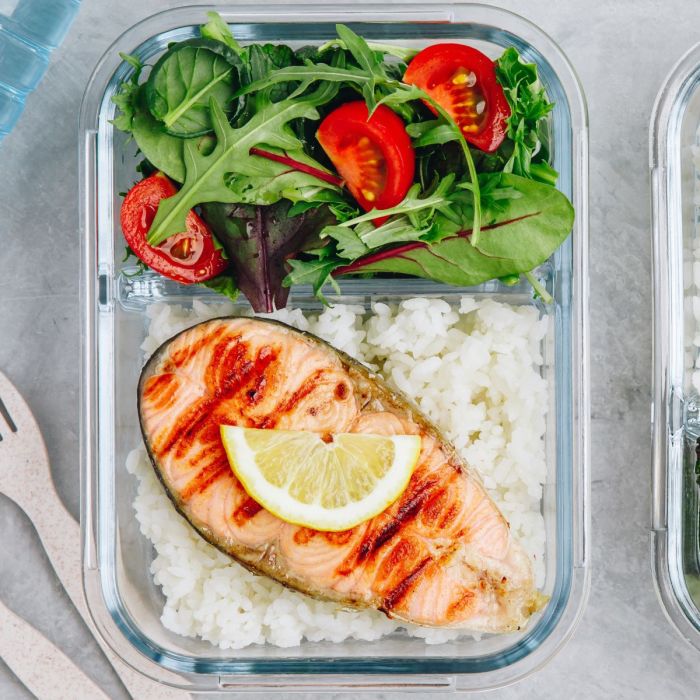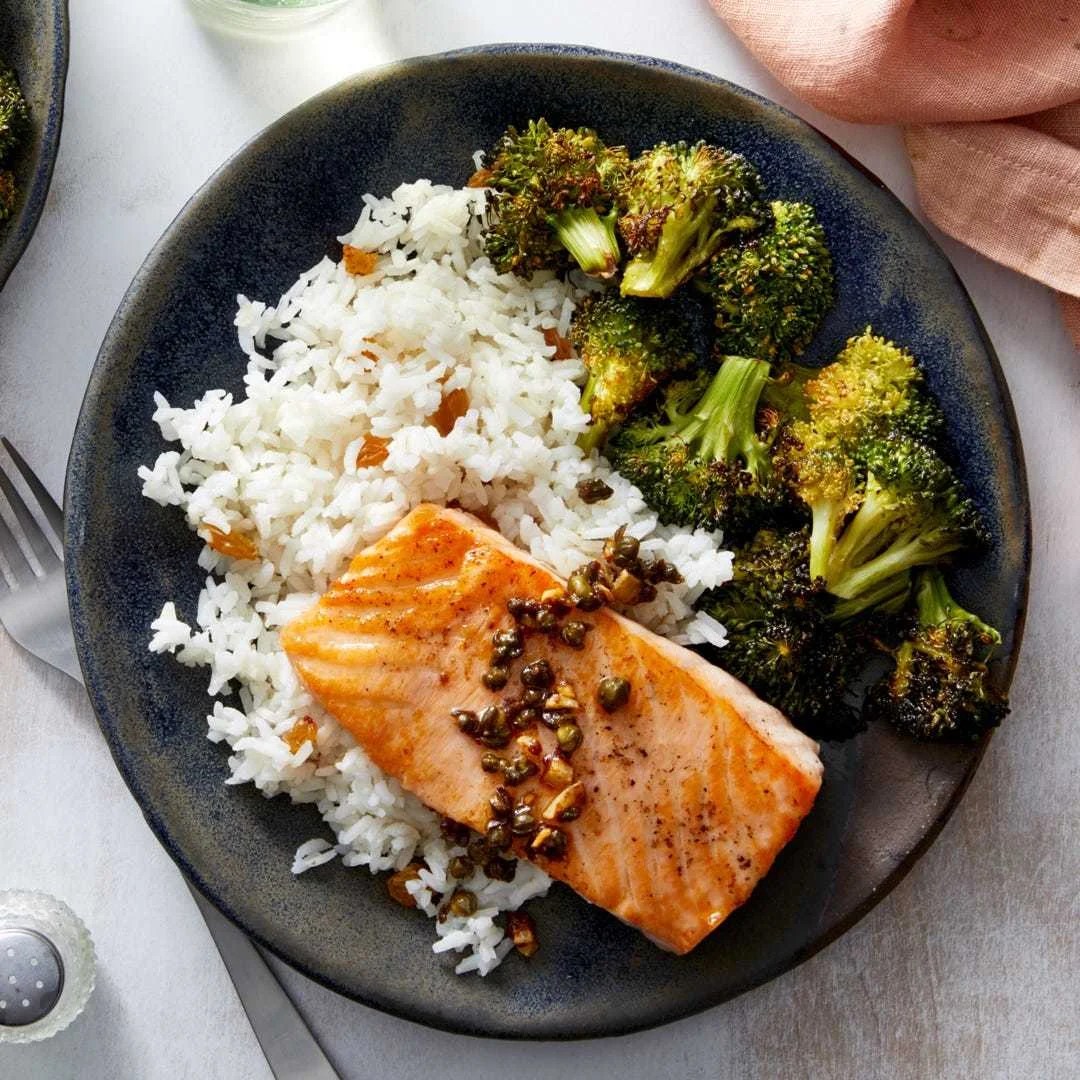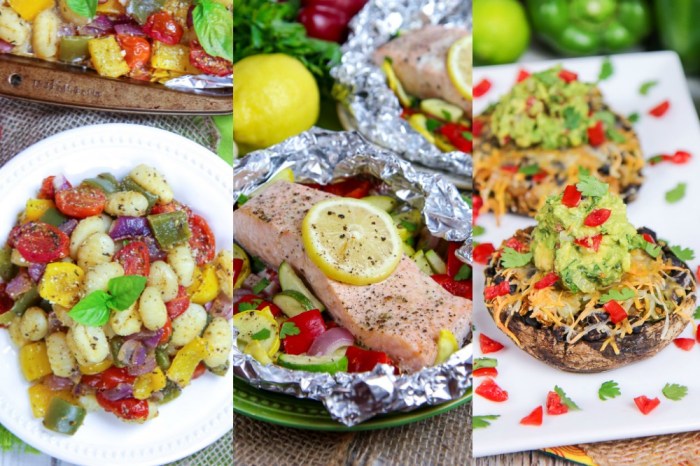Embark on a culinary adventure with pescatarian meal prep, a convenient and nutritious approach to eating that revolves around the goodness of seafood and plant-based ingredients. Discover the art of planning, organizing, and preparing delectable pescatarian meals that will fuel your body and tantalize your taste buds.
Delve into the world of pescatarian meal prep, where seafood takes center stage alongside a symphony of fresh produce, whole grains, and legumes. Learn the secrets of crafting balanced and flavorful meals that cater to your dietary needs and preferences, leaving you feeling satisfied and energized.
Introduction to Pescatarian Meal Prep

A pescatarian diet emphasizes seafood, while excluding meat and poultry. It’s a healthy choice that provides essential nutrients like omega-3 fatty acids. Meal prepping for a pescatarian diet can save time, reduce stress, and ensure you’re eating balanced meals.
Planning and Organizing Pescatarian Meal Prep
Plan your meals ahead of time, considering variety, nutritional needs, and dietary restrictions. Choose recipes that can be easily prepared in bulk and stored for several days. Consider using a meal-planning app or website for convenience.
Organize your ingredients efficiently. Store seafood properly in the refrigerator or freezer. Use clear containers for easy visibility and access. Label containers with the meal name and date to prevent confusion.
Essential Ingredients for Pescatarian Meal Prep
Pescatarian meal prep involves a balanced combination of seafood, plant-based foods, and essential nutrients. To ensure a nutritious and satisfying meal plan, it’s crucial to stock up on a variety of key ingredients.
These ingredients provide a foundation for creating flavorful, nutrient-rich meals that support overall health and well-being.
Proteins
- Fish:Rich in omega-3 fatty acids, protein, and essential vitamins and minerals.
- Shellfish:Excellent sources of protein, iron, and vitamin B12.
- Tofu and tempeh:Plant-based protein sources that provide essential amino acids.
- Eggs:A versatile protein source rich in vitamins, minerals, and antioxidants.
Vegetables
- Leafy greens:High in vitamins, minerals, and fiber.
- Cruciferous vegetables:Rich in antioxidants, vitamins, and fiber.
- Root vegetables:Excellent sources of vitamins, minerals, and fiber.
- Avocados:Rich in healthy fats, vitamins, and minerals.
Grains, Pescatarian meal prep
- Brown rice:A whole grain rich in fiber, vitamins, and minerals.
- Quinoa:A complete protein source also high in fiber and antioxidants.
- Oats:A versatile grain rich in fiber, vitamins, and minerals.
- Whole-wheat bread:A good source of fiber, vitamins, and minerals.
Fruits
- Berries:High in antioxidants, vitamins, and fiber.
- Citrus fruits:Rich in vitamin C, antioxidants, and fiber.
- Bananas:A good source of potassium, vitamins, and fiber.
- Apples:Rich in fiber, vitamins, and antioxidants.
Healthy Fats
- Olive oil:A heart-healthy fat rich in antioxidants.
- Avocado oil:A monounsaturated fat that supports heart health.
- Nuts and seeds:Excellent sources of healthy fats, protein, and fiber.
Other Essential Ingredients
- Herbs and spices:Enhance flavor and provide antioxidants.
- Vinegar:Adds flavor and can aid in digestion.
- Lemon juice:Brightens flavors and provides vitamin C.
Sample Pescatarian Meal Prep Recipes
Pescatarian meal prep is a great way to save time and money while eating healthy and delicious meals. Here is a sample weekly meal plan with breakfast, lunch, dinner, and snack options, along with detailed recipes for each meal.
Weekly Meal Plan
- Breakfast: Oatmeal with berries and nuts, yogurt with fruit and granola, eggs with whole-wheat toast, or a smoothie made with fruit, yogurt, and milk.
- Lunch: Salad with grilled salmon, tuna salad sandwich, or a wrap with hummus, vegetables, and grilled chicken.
- Dinner: Salmon with roasted vegetables, tilapia with lemon and dill, or shrimp scampi with whole-wheat pasta.
- Snacks: Fruits and vegetables, nuts and seeds, yogurt, or a protein bar.
Detailed Recipes
Salmon with Roasted Vegetables
- Ingredients:
- 1 pound salmon fillet
- 1 tablespoon olive oil
- 1 teaspoon salt
- 1/2 teaspoon black pepper
- 1 cup broccoli florets
- 1 cup carrots, sliced
- 1/2 cup red onion, chopped
- Instructions:
- Preheat oven to 400 degrees F (200 degrees C).
- Line a baking sheet with parchment paper.
- Place salmon fillet on the prepared baking sheet.
- Drizzle with olive oil and season with salt and pepper.
- In a medium bowl, combine broccoli, carrots, and red onion.
- Toss vegetables with olive oil and season with salt and pepper.
- Spread vegetables around the salmon on the baking sheet.
- Bake for 15-20 minutes, or until salmon is cooked through and vegetables are tender.
- Nutritional information:
- Calories: 350
- Protein: 30 grams
- Fat: 15 grams
- Carbohydrates: 30 grams
Meal Prep Containers and Storage
Meal prep containers are essential for storing and transporting your pescatarian meals. There are a variety of containers available, so it’s important to choose ones that are the right size and shape for your needs.Glass containers are a good option because they are non-porous and won’t absorb odors or flavors from your food.
They are also microwave- and oven-safe, so you can reheat your meals without having to transfer them to another container.Plastic containers are another popular option. They are lightweight and inexpensive, but they can be more difficult to clean than glass containers.
Some plastic containers are not microwave-safe, so it’s important to check the label before using them.No matter what type of container you choose, it’s important to make sure that it is airtight. This will help to prevent your food from spoiling.
Storing Pescatarian Meals
Once you have prepared your pescatarian meals, it’s important to store them properly to prevent spoilage. Here are a few tips:* Store cooked fish and seafood in the refrigerator for up to 3 days.
A typical vegetarian diet is one that excludes all animal products, including meat, poultry, fish, eggs, and dairy. This type of diet is often adopted for ethical, environmental, or health reasons. Vegetarians typically consume a wide variety of plant-based foods, such as fruits, vegetables, whole grains, legumes, and nuts.
- Store raw fish and seafood in the refrigerator for up to 2 days.
- Freeze cooked fish and seafood for up to 3 months.
- Freeze raw fish and seafood for up to 6 months.
- When reheating pescatarian meals, be sure to heat them to an internal temperature of 145 degrees Fahrenheit.
Benefits of Pescatarian Meal Prep

Adopting a pescatarian diet, which emphasizes the consumption of fish and other seafood while excluding meat and poultry, offers numerous health benefits. Meal prepping further enhances these benefits by promoting regular, balanced meals, reducing the risk of overeating, and saving time and effort.
Pescatarian diets are rich in omega-3 fatty acids, which are essential for heart health, brain function, and inflammation reduction. Fish is also a good source of protein, vitamins, and minerals, including vitamin D, selenium, and iodine. By incorporating fish into meal prep, individuals can ensure they are consuming these essential nutrients regularly.
Convenience and Time-Saving
Meal prepping pescatarian meals can significantly save time and effort during the week. By planning meals in advance and preparing them on the weekend or during designated time slots, individuals can avoid the stress of last-minute cooking or unhealthy choices due to lack of time.
This convenience promotes healthier eating habits and reduces the likelihood of skipping meals or resorting to processed foods.
Pescatarian Meal Prep for Specific Dietary Needs

Pescatarian meal prep can be easily adapted to meet specific dietary needs. Whether you have allergies, intolerances, or follow a particular lifestyle, there are plenty of options available.
A typical vegetarian diet consists primarily of plant-based foods, such as fruits, vegetables, whole grains, and legumes. It is often considered a healthier alternative to a meat-based diet, as it provides numerous essential nutrients and antioxidants.
For pescatarians with allergies or intolerances, it’s essential to carefully check ingredient lists and consult with a healthcare professional to identify potential allergens. Common allergens in pescatarian meals include shellfish, dairy, eggs, and gluten.
Gluten-Free Pescatarian Meal Prep
To make pescatarian meal prep gluten-free, simply swap out gluten-containing ingredients like bread, pasta, and soy sauce for gluten-free alternatives. Some examples include:
- Use gluten-free bread or wraps for sandwiches and wraps.
- Choose gluten-free pasta made from brown rice, quinoa, or lentils.
- Opt for gluten-free soy sauce or tamari.
Dairy-Free Pescatarian Meal Prep
To make pescatarian meal prep dairy-free, substitute dairy products with plant-based alternatives. Some examples include:
- Use dairy-free milk, such as almond milk, oat milk, or soy milk.
- Choose dairy-free yogurt made from coconut, soy, or almond.
- Opt for dairy-free cheese made from soy, almond, or cashew.
Vegan Pescatarian Meal Prep
Vegan pescatarians exclude all animal products, including fish. To adapt pescatarian meal prep to a vegan diet, simply replace fish with plant-based protein sources. Some examples include:
- Use tofu, tempeh, or seitan in stir-fries, curries, and salads.
- Include legumes, such as beans, lentils, and chickpeas, in soups, stews, and salads.
- Opt for plant-based seafood alternatives made from algae or soy.
Epilogue
Pescatarian meal prep is not just a chore but a gateway to a healthier and more sustainable lifestyle. By embracing the bounty of the sea and the land, you can nourish your body, save time, and reduce your environmental footprint.
Whether you’re a seasoned pescatarian or just starting your journey, this comprehensive guide has everything you need to make meal prep a breeze and enjoy the countless benefits of a pescatarian diet.
FAQs
What are the key benefits of pescatarian meal prep?
Pescatarian meal prep offers numerous benefits, including improved heart health, reduced risk of chronic diseases, enhanced cognitive function, and weight management.
How can I incorporate pescatarian meal prep into my busy schedule?
Plan your meals in advance, utilize time-saving appliances like a slow cooker or Instant Pot, and delegate tasks to family members or roommates to streamline the process.
What are some tips for storing and reheating pescatarian meals safely?
Store meals in airtight containers in the refrigerator for up to 3 days or in the freezer for up to 3 months. Reheat meals thoroughly to an internal temperature of 165°F (74°C) before consuming.